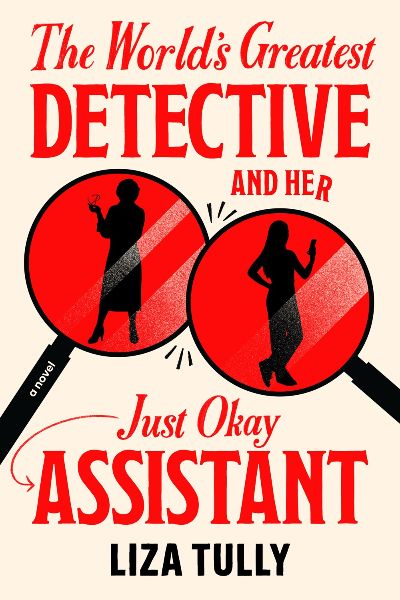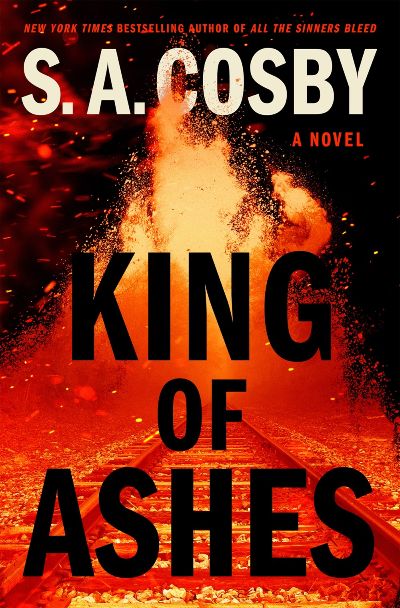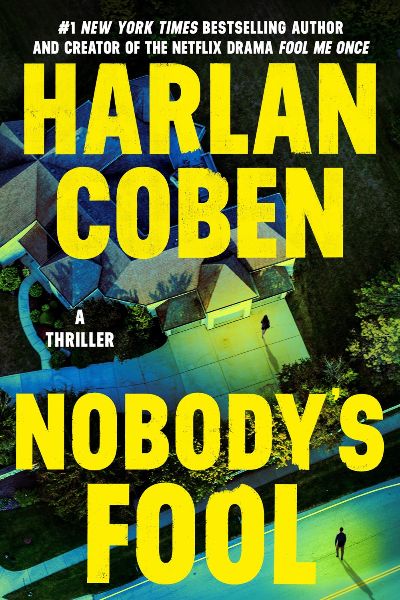A traditional mystery full of quirky characters and humorous situations, this feel-good narrative is told by Gen Z’s Olivia Blunt, who remains ticked off with her famous boss (low wages, no opportunities for growth, hostile environment), Boomer Aubrey Merritt. Olivia dreams of being more than an assistant, but in the meantime she’s soaking up everything she can about the job from Aubrey (she has to retire or die someday, right?) while evaluating possible cases. Which is how she and Aubrey end up on Vermont’s beautiful Lake Champlain, where they’ve been hired to investigate the murder—or is it suicide?—of Victoria Summersworth, the matriarch of a family that owns a sprawling resort on the lake. Readers will enjoy the cast of largely middle-aged family members, employees, and general hangers-on as Olivia and Aubrey grill each and every one of them. The ending may be totally surprising as Aubrey delivers quite the denouement in the tradition of Agatha Christie.
Mystery & Detective
It’s 1954, and most people in Great Britain seem happy to put the second world war behind them. Nora Breen, previously a nun and a nurse, asks to be released from her vow of 30 years to pursue Frieda, a young novice she is fond of who has left the monastery. Frieda promised Nora she would write—and she did, until suddenly she stopped. The only choice Nora has is to head south, settling at Gulls Nest, a small, shabby guest house in the seaside town of Gore-on-Sea, Kent, where Frieda had been living. One would think that Gulls Nest was all fresh air and new starts, but while the air is fresh, nearly every resident of Gulls Nest has their own secrets, some nastier than others, which Nora tries to pry from her fellow residents. But within days of arriving, Nora stumbles across a series of murders, offering the police her medical knowledge in helping to discover the murderer, an offer that initially is met with disdain (although by the end of the book, the police chief is seeking her advice). It’s a pleasure to watch Nora adapt to the secular world, use her immense empathy, and explore her rich inner life. It would seem that this is the first book in the series “Nora Breen Investigates,” something that will delight traditional and cozy readers alike.
A gripping family story packed with tension, violence, and secrets that’s sure to enthrall Cosby’s legions of fans. It introduces the Carruthers clan of Jefferson Run, GA. The town, known to local kids and jaded adults as Jefferson Got the Runs, used to be prosperous, but “now all we make are orphans and widows.” In a gray area in that regard is Keith Carruthers, who might or might not be widowed. His wife hasn’t been seen for years; he’s the owner of a crematory; and locals think he killed and disposed of her himself. Now that he’s been the victim of a hit-and-run and is comatose, his grown children, Roman, Dante, and Neveah, may never know what happened to their mother. But that’s the least of their worries after rich, successful Roman returns from Atlanta to see his father and tries to help Dante, who’s in trouble with ruthless local gangsters. Roman is used to more than a little white-collar sleight of hand in his financial advising business, but is quickly far out of his depth in the evil underbelly of his hometown. “We all fall short of grace, but the beauty lives in the attempt,” says Cosby (All the Sinners Bleed, The Best American Mystery and Suspense 2024), neatly summing up Dante’s increasingly bloody helping hand and the family’s striving to love one another even when the world gives them every reason to give up.
It’s 1954, and most people in Great Britain seem happy to put the second world war behind them. Nora Breen, previously a nun and a nurse, asks to be released from her vow of 30 years to pursue Frieda, a young novice she is fond of who has left the monastery. Frieda promised Nora she would write—and she did, until suddenly she stopped. The only choice Nora has is to head south, settling at Gulls Nest, a small, shabby guest house in the seaside town of Gore-on-Sea, Kent, where Frieda had been living. One would think that Gulls Nest was all fresh air and new starts, but while the air is fresh, nearly every resident of Gulls Nest has their own secrets, some nastier than others, which Nora tries to pry from her fellow residents. But within days of arriving, Nora stumbles across a series of murders, offering the police her medical knowledge in helping to discover the murderer, an offer that initially is met with disdain (although by the end of the book, the police chief is seeking her advice). It’s a pleasure to watch Nora adapt to the secular world, use her immense empathy, and explore her rich inner life. It would seem that this is the first book in the series “Nora Breen Investigates,” something that will delight traditional and cozy readers alike.
This is not an easy time for Sheriff Red Hammergren. She’s a widow in the job her husband once held, with the purse strings held by a toxically masculine board. It’s January in Minnesota, snowing with more predicted, serious drug problems in the town, and the comic relief of an insulting new webpage done by a leading citizen’s nephew. An elderly man with dementia has wandered off without his coat, there is a missing teenage girl, and the snowplows can’t keep up with what’s coming down. Red locates the man, but Missy, the teen, has reasons for running that are unclear. The danger Missy is in comes not only from the weather but from some really bad individuals. Red has to connect all the pieces—information from cold cases of the past, secrets in the present—while trying to keep everyone safe from the weather and from the danger she senses but can’t define. Red is a wonderful character, fighting to save her town with loyal deputies and a group of retired nurses. She succeeds in the end by her ability to listen. It seems we will see more of Red, one would hope in a more pleasant season.
A case from almost 60 years ago threatens the present in Gilbert’s (Schooled in Murder, 2025) latest addition to her terrific Blue Ridge Library mystery series. A true-crime author, Maureen Dryden, visits the library run by Amy Muir to give a book talk and pursue a cold case from the area for her next book. She’s famous for writing about an unsolved crime in her previous book, and her identification of the killer resulted in the accused dying by suicide. One of the folks Maureen’s trying to track down is Kurt Kendrick, godfather to Amy’s children. When Maureen dies, Kurt ends up at the top of the suspect list. Amy’s investigation goes badly from the start, and Kurt is a bit too angry and demanding when Amy asks him questions, scaring her. It seems that bringing up the past makes a lot of residents in town reluctant to provide answers. When Amy starts receiving death threats, she realizes she might have gone too far this time. Gilbert does a terrific job of keeping the pace while showcasing a realistic small town with relatable characters. The solution to the mystery might seem obvious, but Gilbert has a few twists in store that will keep the reader guessing until the last page.
Cozy mysteries have a template of sorts. They are usually set in a small town, and often set in a small business with a friendly, plucky, sleuthy heroine. Trouble, sometimes from the past, drops into the mix to spoil the perfection. Bait and Swiss is a fine example of the genre, with all the proper elements in place from chapter one. Willa and her incredibly simpatico team from her cheese shop, Curds & Whey, preparing for their second anniversary celebration, pause to attend the grand opening of a neighboring cake shop. Surprisingly, the cake shop includes a chocolatier run by Willa’s ex-fiancé and best friend from 10 years ago. In the chaos of the opening, Willa delivers samples of the chocolates to the newspaper editor, a reporter is poisoned, and the lovely town is in a panic. Willa’s relationship with the hunky local detective is in danger, but she sleuths on, partnering in a somewhat slapstick style with the editor. Food sales are down all over the town as the population fears poison from all quarters, but friendships hold firm and instincts are strong though the who-done-it is a surprise. The recipes at the end underscore the power of cheese. Fun all around from Moss (Cheddar Off Dead, 2022).
Arranging an exhibit “Inspired by Shudder Pulp dime magazines and the legend of our very own lake monster” promises to be a fun project for artist Charley Scott, curator of her small-town Canada art gallery. Local lore about the Nessie-like monster should be enough to draw the curious, but it makes one local, Laura Bouchard, very upset. Laura shows up at the gallery angry and dishevelled, with two things she’s adamant about. First, she was just attacked by the lake monster. Second, Charley had better not go ahead with this exhibit. When Laura is later found dead of “dry drowning,” or dying of water inhalation hours after the fact, Charley sets to work getting to the bottom of the myth and what really happened to Laura. Cozy fans will enjoy the small-town tale that’s complete with eccentric locals, a chocolate shop that offers a worrying subplot, and Charley’s steadfast dog. Darker elements are added: Laura was not well liked in the town, for example, and elements of witchcraft creep in, making this a tale both for cozy fans and for those who like a more sinister mystery. This is the second in the series, and readers will want to go back to the first installment, Cover Art.
It’s loathing at first sight when trained opera singer Kit (stage name Katerina) Margolis meets her understudy, the sexually alluring Yolanda Archambeau, on the first day of rehearsals for Barbarella, a new opera based on the 1968 film. Kit, struggling to prove she is right for the titular role, her first leading part, is taken aback when her director introduces Yolanda to the cast, something not done until later in the rehearsal process. “I felt a flash of irritation, uncharitable yet valid. She didn’t need to be there. She shouldn’t be there.” Kit’s unease rises when Yolanda yawns during Kit’s big aria and later confesses her operatic ambitions, despite her lack of training. Regarding underhanded scheming, Eve Harrington (of the film All About Eve) has nothing on the ruthless Yolanda, whose weapons against Kit include poisoned tea and dead rats. But before her plotting can escalate to a deadlier level, Yolanda is fatally stabbed in her apartment. Kit, who briefly falls under suspicion because of a violent incident in her past, turns sleuth to uncover her late rival’s dark secrets and identify her killer. Offering an entertaining look at the backstage world of New York City opera, Richter’s second novel (after The Divide) skillfully mixes the tropes of a psychological thriller with the conventions of an amateur sleuth mystery. Especially compelling is Kit’s growing self-confidence as a singer and a woman as she pursues the truth.
Coben (Think Twice) brings back former Detective Sami Kierce from Fool Me Once (the book and the NetFlix series) as his past crashes into his simple life. Sami works as a private investigator, doing jobs that embarrass him. He teaches a true-crime class at night school and lives with his wife and year-old son. Sami might want answers from past events in his life, but thinks he will never learn the truth until a woman he recognizes arrives in his class. When Sami graduated from college, he met Anna on a trip to Spain, and for days their lives were bliss until she ended up dead. But the woman Sami sees in his class is Anna, and Sami stumbles into a larger mystery that seems unrelated to his time overseas. To add to the investigator’s increasing stress, the person responsible for killing his partner when he worked in law enforcement is released from prison and asks Sami to reinvestigate the case to prove his innocence. Then Sami’s wife, Molly, thinks she is being stalked, and the lurid texts proving she’s right begin popping up on Sami’s phone. Coben juggles several complex stories, each one of which would be compelling by itself but that together create a page-turning experience that will leave fans and newcomers to Coben enthralled. The twists are shocking, and Sami; his wife, Molly; and the supporting cast are so much fun. Coben would be foolish not to bring them back for another story.










